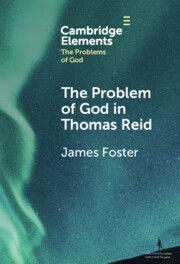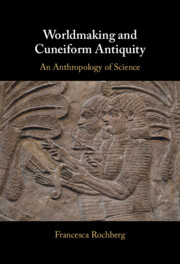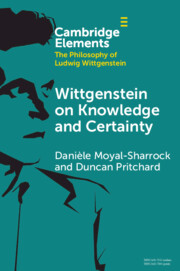358 results
Navigating the biosocial: perspectives of early career researchers working with birth cohorts.
-
- Journal:
- Journal of Biosocial Science , First View
- Published online by Cambridge University Press:
- 28 February 2025, pp. 1-8
-
- Article
-
- You have access
- Open access
- HTML
- Export citation
3 - An Empire of Experts
-
- Book:
- Global Servants of the Spanish King
- Published online:
- 20 February 2025
- Print publication:
- 27 February 2025, pp 128-165
-
- Chapter
- Export citation
Should Science Journalists Know Science?
-
- Journal:
- Canadian Journal of Philosophy , FirstView
- Published online by Cambridge University Press:
- 26 February 2025, pp. 1-19
-
- Article
-
- You have access
- Open access
- HTML
- Export citation
Chapter 4 - What Kinds of Problems Do Historians Solve?
-
- Book:
- Teaching History in Higher Education
- Published online:
- 07 February 2025
- Print publication:
- 20 February 2025, pp 130-182
-
- Chapter
- Export citation

The Problem of God in Thomas Reid
-
- Published online:
- 06 February 2025
- Print publication:
- 06 February 2025
-
- Element
- Export citation
Chapter 6 - The Language Problem
-
- Book:
- Otto Neurath in Britain
- Published online:
- 09 January 2025
- Print publication:
- 23 January 2025, pp 154-178
-
- Chapter
- Export citation
Feminist Institutionalism and Ethnography: Crafting Research from a Diverse Methodological Menu
-
- Journal:
- Politics & Gender , First View
- Published online by Cambridge University Press:
- 17 January 2025, pp. 1-26
-
- Article
-
- You have access
- Open access
- HTML
- Export citation
1 - Nature as the Transcendental Imaginary of Modern Secular Society
- from Part I - The Rise of Western Politics following the Collapse of the Monistic Medieval Cosmology
-
- Book:
- Can Democracy Recover?
- Published online:
- 02 January 2025
- Print publication:
- 16 January 2025, pp 15-20
-
- Chapter
- Export citation
7 - The Visibility and Accountability of Political Power
- from Part II - The Emergence of the Epistemological Constitution of Modern Democracy
-
- Book:
- Can Democracy Recover?
- Published online:
- 02 January 2025
- Print publication:
- 16 January 2025, pp 77-81
-
- Chapter
- Export citation
12 - The Political Disempowerment of the Modern Democratic Citizen
- from Part IV - The Erosion of the Epistemological Constitution of Modern Democracy
-
- Book:
- Can Democracy Recover?
- Published online:
- 02 January 2025
- Print publication:
- 16 January 2025, pp 129-133
-
- Chapter
- Export citation
An Institute of Residual Studies? Nkrumah and the “Afroepistemic” Origins of the Institute of African Studies, University of Ghana
-
- Journal:
- The Journal of African History , First View
- Published online by Cambridge University Press:
- 15 January 2025, pp. 1-17
-
- Article
-
- You have access
- Open access
- HTML
- Export citation

Worldmaking and Cuneiform Antiquity
- An Anthropology of Science
-
- Published online:
- 09 January 2025
- Print publication:
- 09 January 2025
Business and Society, the Society and Business, and, What Is It Like to Be a Rat?
-
- Journal:
- Business Ethics Quarterly / Volume 35 / Issue 1 / January 2025
- Published online by Cambridge University Press:
- 27 February 2025, pp. 124-140
- Print publication:
- January 2025
-
- Article
- Export citation

Wittgenstein on Knowledge and Certainty
-
- Published online:
- 05 December 2024
- Print publication:
- 09 January 2025
-
- Element
- Export citation
13 - Evidencing Conversation-Analytic Claims: How Participants Orient to Social Action
- from Part IV - Evidence
-
- Book:
- The Cambridge Handbook of Methods in Conversation Analysis
- Published online:
- 06 December 2024
- Print publication:
- 05 December 2024, pp 315-355
-
- Chapter
- Export citation
1 - Methods in Conversation Analysis
- from Part I - Introduction
-
- Book:
- The Cambridge Handbook of Methods in Conversation Analysis
- Published online:
- 06 December 2024
- Print publication:
- 05 December 2024, pp 3-48
-
- Chapter
- Export citation
Introduction
-
-
- Book:
- Rethinking Global History
- Published online:
- 14 November 2024
- Print publication:
- 21 November 2024, pp 1-20
-
- Chapter
-
- You have access
- Open access
- HTML
- Export citation
Chapter 2 - Thriving within Ourselves: Epistemic Injustice and Individual Wellness
-
-
- Book:
- How People Thrive
- Published online:
- 14 November 2024
- Print publication:
- 21 November 2024, pp 37-64
-
- Chapter
- Export citation
3 - Modal Logic
-
- Book:
- An Introduction to Classical and Modal Logics
- Published online:
- 08 February 2025
- Print publication:
- 21 November 2024, pp 85-144
-
- Chapter
- Export citation
3 - Political Thought and the Historiography of International Law
- from Part I - The Historiography of International Law
-
-
- Book:
- The Cambridge History of International Law
- Published online:
- 06 December 2024
- Print publication:
- 21 November 2024, pp 107-135
-
- Chapter
- Export citation


